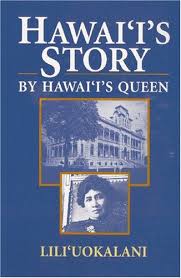Good Reads meta-data is 424 pages, rated 3.84 by 632 litizens.

Liliuokalani (1838–1917) became the last royal sovereign of the Hawaiian Islands. In this autobiography she refers to them and the people as Hawaiian. Captain James Cook had called them the Sandwich Islands to honour the First Lord of the Admiralty who had commissioned the voyage.
Most of the book consists of reminiscences about the good old days, and repeated assertions that every native Hawaiian loved the monarchy, the monarchs, and the numerous members of the several royal families. There is a brief, early reference to the bloody wars among the peoples of these islands, long before the arrival of Captain Cook, to establish the monarchy, and political compromises that produces the plurality of royal families.
Absent from these recollections is the reality of the sui generis native conquest, genocide, and compromise. The name Hawaii was the name of one of the islands from which came the victorious tribe which then planted its name on the whole group, after conquering Molokai, Maui, and Oahu. The Nuʻuanu Pali lookout north of Honolulu was the scene of the final massacre. More blood was shed in the conquest of Hawaiians by Hawaiians than in the American annexation.
Only from Chapter 39 on does the story become interesting as annexation to the United States draws near and finally occurs. The focus is on Hawaii and Hawaiians as victims. Though earlier much is made of the relationship of the Hawaiian monarchy to Great Britain, there is no reference to a British role in permitting, encouraging, tolerating this American appropriation. Too bad, because I wondered about that. Nor do we hear anything about those natives who preferred Americans to an indolent, unresponsive, tribal, and taxing monarchy.
Annexation was indeed a sorry story, even if the telling here is one-eyed, which occurred during the administration of one of most inept and lazy American presidents, Grover Cleveland. His name is much mentioned in these pages. A biography of this man-mountain is discussed elsewhere on this blog.
Mark Twain, a frequent visitor to the islands, opposed annexation virulently. There is much name-dropping in the book but his is not among those dropped in my hearing. Try his ‘Letters from Hawaii,’ a collection of 25 letters that he wrote from Hawaii in 1866. He was there four months as a correspondent for the ‘Sacramento Bee.’ The letters were only published in 1947.
I listened to it in on Audible. The reading is superb, though the content is seldom interesting and rarely convincing. Autobiographies are like that.
In our many visits to Hawaii we have been some of the places mentioned in this book, and I listened to it in anticipation of another visit in 2019.
Her entry in Wikipedia is a battleground in Wiki wars, being edited, and re-edited almost daily. I checked as I was listening to the book. History is constantly rewritten on Wikipedia.
Skip to content
